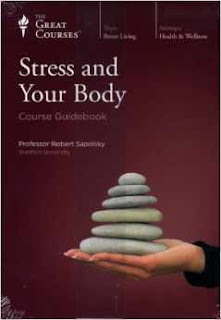 |
| Stress and Your Body |
5/15/2018 – I’m not done with this, yet, and there will be a complete review later, but I had to complain about something that really bugs me. This series of lectures is presented by a professor with multiple advanced degrees, including at least one in psychology, yet he said that positive reinforcement and negative reinforcement are essentially reward and punishment.
People, stop making this mistake! This is not rocket science, and it’s a lot more basic than the neuroscience that makes up the majority of these lectures, so why spread misinformation? It makes me wonder what else he got wrong.
Once and for all, let’s get it straight. Positive reinforcement = reward. No one gets these confused. With me so far? Punishment = punishment. Duh. Negative reinforcement is its own thing, it is NOT punishment! ::mutter::
Definitions.
Positive reinforcement – a stimulus which, when applied after a behavior, makes it more likely for the behavior to recur. In simple terms – you do something I like, I give you a cookie… a warm, gooey, chocolate chip cookie with a glass of ice cold milk.
Punishment – a stimulus which, when applied after a behavior, makes it less likely for the behavior to occur. You do something I don’t like, and I smack your hand. I told you to stop groping me, but you wouldn’t listen. Assuming you don’t like your hand smacked, you are less likely to grope me in the future.
Negative reinforcement – a stimulus which, when removed after a behavior, makes it more likely for the behavior to recur. Your dryer starts buzzing when the clothing is dry and doesn’t stop until you open the door. It doesn’t reward you for folding the laundry and putting it away, that’s on you, it just wants you to open that darn door.
You see, with a negative reinforcer, you don’t like the buzzing so you are more likely to open the door to make the buzzing stop. The removal of the buzzing happens after the behavior and rewards you for taking action.
By the way, there is such a thing as positive and negative punishment, but almost no one makes the distinction. Negative punishment would be the removal of something after a behavior which would discourage that behavior in the future. Your kid doesn’t do his homework so you turn off the WiFi and he can no longer play Dota 2. Next time you tell him to do his homework he would, presumably, be more likely to perform the desired behavior. On a side note, punishment is a lot less effective in changing behavior than reward. In fact, many behaviorists in the field have stopped using punishment entirely. It’s an exciting trend.
Back to the explanation. It’s all about timing and intent. A positive reinforcement and punishment always come after the behavior while a negative reinforcer starts before the behavior and ends when the behavior is performed. The reason it’s called negative is because the stimulus is removed not added. Its intent, however, is to increase the behavior, just like with a positive reinforcer. A punishment is always intended to decrease the behavior. Do you see why the two are not the same? If not, just ask, I’ll talk about this nonsense for hours.
5/16/2018 – Feeling stressed and depressed? Yeah, well, don’t listen to this, it will just make you feel worse. I can sum it up for you in just two words, “stress sucks.” There is a lot of science here, much of which I have heard from other sources.
What I was hoping for was not all of the bio-mechanics or neuroscience of stress, but some insight into how to mitigate the effects. There are 24 chapters/lectures here and only one of them offers any advice, more as an afterthought than a serious attempt to help. Of that advice the only thing I remember is that exercise is good for stress relief, but only if it’s exercise you like. Forget forcing yourself to go to the gym, if it’s not fun it will just make your stress worse. Oh, and that old stand-by, meditation? Nope, won’t help you unless you love it.
Now, if only I could get back the hours I wasted listening to this and spend it reading a book I enjoyed or playing Skyrim, that would be a better use of my time and might actually do something to reduce my stress.





